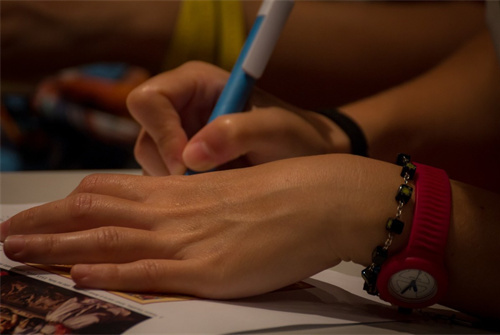【简介】感谢网友“36437”参与投稿,这里小编给大家分享一些,方便大家学习。
英语分词改写句子练习及教案
篇一:按要求改写句子(完)
按要求改写句子:(50题)
【第1句】:. Liu Hua usually gets on line on Sundays.(改为一般疑问句)
【第2句】: Mary is wearing a beautiful skirt.(改为感叹句)
【第3句】: My brother is so young that he can’t go to school.(同义句转换)
【第4句】: My friend spent a few weeks in making that machine last year.(同义句转换) (对划线部分提问)
6.Mary does her homework at home.(改为否定句)
【第7句】: Mother often tells her children a story at bed time.(变为被动语态) 对划线部分强调)
【第9句】: This is my book.(改为复数形式) (对划线部分提问)
【第11句】: You sent me a present. I thank you very much for it.(合并为一个复合句)
【第12句】: As soon as the picnic baskets were unpacked, it began to rain.(用No sooner…than改写)
【第13句】: It is still believed in some countries that the earth is flat.(用“名词+同位语从句”改写)
【第14句】: Jane lived away from her children so that she could get some peace.(改为同义句)
【第15句】: We planned to show the film in the open air. The bad weather ruined our plan.(用不定式形式改写句子)
【第16句】: He was thoughtful to bring us the raincoat. (用 of+sb.+to do 或 for+sb.+to do 改写句子)
【第17句】: They will go on a group tour. They believe it is cheaper to do so.( 用v.+it+adj.+to do形式改写句子)
【第18句】: The rice which grows in this area is of a special kind.( 用分词短语改写句子)
【第19句】: He prayed silently and his eyes were closed. ( 用分词短语改写句子)
【第20句】: Tom fell ill. He had eaten too much ice-cream. ( 用动名词短语改写句子)
【第21句】:She was dancing with a student. He had a slight limp. (合并为定语从句)
【第22句】:Jane lived away from her children so that she could get some peace. (用不定式形式改写句子)
【第23句】: Here are some articles that you are to translate. (用不定式形式改写句子)
【第24句】: Professor Robinson was a teacher. He found that reward. ( 用v.+it+adj.+to do形式改写句子)
【第25句】: The cars that are parked in the fire lane will be ticketed. (用分词短语改写句子)
【第26句】: As the secretary was away, Mr Green had to type his final grade. ( 用分词短语改写句子)
【第27句】:A cold rain was falling. It was mixed with snow. ( 用分词短语改写句子)
【第28句】:As soon as the picnic baskets were unpacked, it began to rain.(用No sooner…than改写) 对划线部分提问)
【第30句】:I’ll give you all necessary information. (改为被动句)
【第31句】:Fire destroyed much of London in the 17th century. (改为被动句)
【第32句】:They are pulling down the old theatre. (改为被动句)
【第33句】:You can find answers to the exercises in the Teacher’s Book. (改为被动句)
【第34句】: My father has breakfast at 8 every day.(改为一般疑问句)
【第35句】: The boy is too young to go to school.(改为同义句)
【第36句】:We found all our seats occupied. (改为被动句)
【第37句】:Are there any children in the garden?(改为单数形式)
【第38句】: This is my book. (改为复数形式) . (对划线部分提问)
【第40句】:Bob showed me an easier way to do the experiment. (改为被动句)
【第41句】: He dares to tell the truth.(改为否定句) (对划线部分提问)
【第43句】: They went for a walk after supper yesterday evening. (改为一般疑问句)
【第44句】: It is an interesting story.(改为感叹句) (对划线部分提问)
46 The moon is shining brightly. (改为感叹句) (对划线部分提问)
【第48句】:The box is so heavy. I can’t lift it. (改为同义句)
give her more responsibility. (用分词短语替换划线部分)
【第50句】:V
(用分词短语替换划线部分)
答案:
【第1句】: Does Li Hua usually get on line on Sunday?
【第2句】: What a beautiful skirt Mary is wearing!
【第3句】: My brother is too young to go to school.
【第4句】: It took my friend a few weeks to make that machine last year.
【第5句】:Who is going to read the next lesson this evening.
【第6句】: Mary does not do her homework at home.
【第7句】: Her children are told a story at bed time. Or: A story is told to her children at bed
time.
【第8句】: It was by the end of last week that we had learned five English songs.
【第9句】: Those are our books.
【第10句】: How long have the twins stayed with their grandparents?
【第11句】:( I )Thank you very much for the present (which/that) you sent me..
【第12句】:No sooner had the picnic baskets been unpacked than it began to rain.
【第13句】: The belief that the earth is flat is still held in some countries.
【第14句】: Jane lived away from her children to get some peace.(or: Jane lived away from her children in order to get some peace. Or: Jane lived away from her children so as to get some peace.)
【第15句】: The bad weather ruined our plan to show the film in the open air.
【第16句】: It was thoughtful of him to bring us the raincoat.
【第17句】: They believe it cheaper to go on a group tour..
【第18句】: The rice growing in this area is of a special kind.
【第19句】: He prayed silently ,(with) his eyes closed.
【第20句】: Eating too much ice-cream made Tom ill.
【第21句】:She was dancing with a student who had a slight limp.
【第22句】:Jane lived away from her children to/in order to/so as to get some peace.
【第23句】: Here are some articles for you to translate.
【第24句】: Professor Robinson found it rewarding to be a teacher.
【第25句】: The cars parked in the fire lane will be ticketed.
【第26句】:The secretary being away, Mr Green had to type his final grade.
【第27句】:A cold rain was falling, mixed with snow.
【第28句】:No sooner had the picnic baskets been unpacked than it began to rain.
29 Who is going to read the next lesson this evening?
【第30句】:All necessary information will be given to you . (or: You will be given all necessary information . )
【第31句】:Much of London was destroyed by fire in the 17th century.
【第32句】:The old theatre is being pulled down.
【第33句】:Answers to the exercises can be found in the Teacher’s Book.
34 Does my father have breakfast at 8 every day?
【第35句】: The boy is so young that he can’t go to school. (or: The boy is not old enough to go to school.)
【第36句】: All our seats were found occupied.
【第37句】:Is there child in the garden?
【第38句】: These are my books.
【第39句】: Whom did my father speak with yesterday?
【第40句】:I was shown the easier way to do the experiment. Or: An easier way to do the experiment was shown to me.
【第41句】: He doesn’t dare to tell the truth. 或He dare not tell the truth.
【第42句】: How long have they lived here?
【第43句】: Did they go for a walk after supper yesterday evening?
【第44句】: What an interesting story (it is)! 或How interesting the story is!
45 How often does this magazine come out?
46 How brightly the moon is shining!
【第47句】:Who is always encouraging us to speak English in class?
【第48句】:The box is too heavy to lift.
【第49句】:Having worked with that technician before, we were reluctant to give her more responsibility.
【第50句】:Very slowly he pulled himself to his feet, using the table as an aid.
【第79句】: Bob showed me an easier way to do the experiment.(改为被动句)
【第80句】: I’ll give you all necessary information. (改为被动句)
【第81句】: Fire destroyed much of London in the 17th century. (改为被动句)
【第82句】:They are pulling down the old theatre. (改为被动句)
【第83句】:You can find answers to the exercises in the Teacher’s Book. (改为被动句)
【第84句】:Two storms have hit the area in the past three weeks. (改为被动句)
答案:
【第79句】: I was shown the easier way to do the experiment. Or: An easier way to do the experiment was shown to me.
【第80句】: All necessary information will be given to you.(or: You will be given all necessary information.)
【第81句】:Much of London was destroyed by fire in the17 th century.
【第82句】:The old theatre is being pulled down.
【第83句】: Answers to the exercises can be found in the Teacher’s Book.
【第84句】: The area has been hit by two storms in the past three weeks.
【第71句】: You sent me a present. I thank you very much for it.
(combine one sentence)
【第72句】:He admires Tom. This surprises me.
(combine one sentence)
give her more
responsibility.
(change underlined part into a participle phrase)
【第74句】:V
(change underlined part into a participle phrase) (change underlined part into a participle phrase)
【第76句】:The doctor didn’(change the underlined part into an infinitive phrase)
【第77句】:Cliff is a doctor. He finds his job rewarding.
(using “v.+it+adj./n.+infinitive”)
【第78句】:Tom often smokes while eating.His friends consider it is bad manner.
(using “v.+it+adj./n.+infinitive”)
【第79句】:The box is so heavy. I can’t lift it.
(using “too…to”)
(change underlined part into a participle phrase)
答案:
【第71句】: Thank you very much for the present( that) you sent me.
【第72句】:He admires Tom, which surprises me.
【第73句】:Having worked with that technician before, we were reluctant to give her more responsibility.
【第74句】:Very slowly he pulled himself to his feet, using the table as an aid.
【第75句】:(If) the weather permitting, the rock concert will be given in the open air.
【第76句】:The doctor didn’t undertake for them to cure the rare disease
【第77句】:Cliff finds it rewarding to be a doctor.
【第78句】: Tom’s friends consider it bad manner for him to smoke while eating.
【第79句】:The box is too heavy to lift.
【第80句】:The cars parked in the fire lane will be ticketed.
【第71句】: Tom’s leg is still in bandages. He will have to watch the match in a wheelchair. (combine one sentence)
【第72句】:I have just got a letter from my sister. The letter is full of interesting news. (combine one sentence)
【第73句】:In hospital they wake patients at 6 a.m. This is much too early.
(combine one sentence)
(change underlined part into a participle phrase)
the hotel manager required all customers to leave their rooms head for the nearest exit.
(change underlined part into a participle phrase) (change the underlined part into an infinitive phrase)
’t have the right to do so.
篇二:分词在句子中的用法(新托福写作 )
第三次课: 分词在句子中的用法
教学目标: 使学生初步了解及在句子使用分词
教学内容:
【第1句】: 动名词及不定式作业讲解
【第2句】:分词
现在分词和过去分词两种。
作为谓语,现在分词和be 一起构成进行时;过去分词和be一起构成被动语态,和have一起构成完成时。
例如:
I am reading a novel by Maupassant. 我正在看一本莫泊桑写的小说。(现在分词和be 一起表示主语正在进行的动作。)
Mr. Robinson has drunk five glasses of wine already. 鲁宾逊先生已经喝了五杯酒了。(过去分词和have 一起表示主语已经完成的动作。)
The gold fish bowl was broken by Xiao Tao just now. 金鱼缸刚才被小陶打破了。(过去分词和be 一起表示主语是动作的承受者。)
作为非谓语形式,分词可用作形容词和副词,在句子中充当定语、表语、补语和状语。但它仍保持动词的一般特征,可以有自己的宾语和状语。分词和自己的宾语、状语构成分词短语。 现在分词有一般式和完成式。它的一般式表示和谓语动词所表示的动作同时发生的行为或存在的状态;它的完成式(having + 过去分词)表示在谓语动词所表示的动作之前发生的动作或存在的状态。
现在分词有主动语态和被动语态(being + 过去分词)。
过去分词只有一般式,表示在谓语动词所表示的动作之前发生的动作。过去分词(及物动词)本身可以表示被动的含义,因而没有别的被动形式。
例如:
Having failed three times, he didn’t want to try again. (=As he had failed three times, he didn’t want to try again.) 他失败了三次,不想再干了。(having failed 表示发生在前的动作)
Walking along the sands, Crusoe saw in the sand the mark of a man’s foot. (=While he was walking along the sands, Crusoe?) 克鲁索沿着沙滩走的时候,看见沙上有人的脚印。(walking 表示同时发生的动作)
The question being discussed seems important. (=The question is being discussed. It seems important.) 正在讨论的问题似乎很重要。
The old days are gone. 旧时代一去不复返了。(gone 表示完成的状态)
I had my hair cut yesterday. 我昨天理发了。(cut 是及物动词的过去分词,表示“被人理发”。) 分词的否定形式是在分词短语前面加上not, never等否定词构成。
例如:
Not fearing the fire, the child touched and got a finger burnt. 小孩儿不知道怕火,用手去摸,把手指烫了。
Not knowing how to find the subway, I asked a policeman for help. 我不知道怎样找到地铁,就去找警察帮忙。
(一)现在分词和过去分词的区别
(1)在语态上现在分词表示主动的意思,表示它所修饰的人或物的行为;及物动词的过去分词表示被动的意思,表示它所修饰的人或物是动作的承受者。换言之,现在分词是它修饰
的成分所作出的动作,过去分词是它修饰的成分所承受的动作。
例如:
convincing facts 有说服力的事实 / convinced audience 被说服了的听众
the exploiting class 剥削阶级 / the exploited class被剥削阶级
a frightening dog一条让人害怕的狗 / a frightened dog一条被吓坏了的狗
driving gears主动齿轮 / driven gears从动齿轮
(2)在时间上,现在分词往往表示动作正在进行,过去分词表示动作已完成。
例如:
the rising sun (正在升起的太阳) / the risen sun(升起的太阳)
the falling rain(正在下的雨)/ the fallen leaves(落下的树叶)
stolen money(被盗的钱/偷来的钱)/ill-gotten wealth(不义之财)
a high-flying kite(高飞的风筝)
再看一些例子:
boiling water 沸腾的水/boiled water 开水/developing countries 发展中国家/developed countries 发达国家/an exciting story 令人激动的故事/ excited people 激动的人们
(2)在时间上,现在分词往往表示动作正在进行,过去分词表示动作已完成。
再看一些例子:
surprising news令人惊讶的消息/a surprised man受惊吓的人/an inspiring leader具有号召力的领袖/the inspired soldiers受到鼓舞的士兵/a delighted speech令人高兴的演说/the delighted audience(感到)高兴的听众/a moving film动人的电影/the moved children受到感到的孩子们/a box containing tea装茶叶的盒子/the tea contained in a box装在盒里的茶叶/ falling snow正在下的雪/fallen snow box落在地上的雪
(3)做表语时的不同。现在分词做表语表示主语所具有的特征,意思是“令人如何”。过去分词多表示主语所处的状态,意思是“感到如何”。
例如:
His lecture is disappointing。I’m disappointed。他的演讲令人失望。我感到失望。
We are surprised to hear the news。The news is surprising。我们听到那消息吃了一惊。那消息令人吃惊。
The situation is encouraging。 We’re encouraged。形式使人鼓舞。我们感到鼓舞。
常用的还有:amusing/amused,astonishing/astonished,disappointing/disappointed,exciting/excited,frightening/frightened,interesting interested,moving/moved, relaxing/relaxed,satisfying/satisfied,shocking/shocked,surprising/surprised,terrifying/terrified,tiring/tired,worrying/worried等等。
(4)做状语的区别,分词短语在句中可做时间、原因、方式、伴随状语。现在分词的动作和谓语动作同时或几乎同时发生、意思是主动的。而过去分词的动作在谓语动作之前发生、意思是被动的。
例如:
Seeing nobody at home,she decided to leave them a note。看到没人在家,她决定给他们留个条。(主动意义,几乎同时)
The secretary worked late into the night,preparing a speech for the president。秘书工作到晚上很晚,给总统准备一篇演说。(主动意义,同时)
Tired of the noise,he closed the window。对噪音感到厌烦,所以他把窗户关上。(被动意义,
在谓语之前)
Deeply moved,she thanked me again and again。她深深地受了感动,再三谢我。(被动意义,在谓语之前)
Persuade by my mother,she gladly went there alone。在我母亲劝说下,她才高兴地独自去那里。(被动意义,在谓语之前)
如果现在分词的动作在谓语动作之前发生,现在分词要用完成形式,但意思仍然是主动的。 例如:
Having watered the vegetables,they began to pick up the Apples。=After they had watered the vegetables,they began to pick up the apples。他们浇完了蔬菜之后就开始摘苹果。 Having finished the work,he packed his tools and left。完工后,他收拾起工具走了。 分词做状语时,前面可用连词或介词。
例如:
After eating my dinner quickly,I went to see Jim off。我赶快吃过晚饭就去给吉姆送行。 Though built before the Second World War,the engine is still in good condition。尽管是在二战以前建的,这引擎仍然处于良好状态。
Unless paying by credit card,please pay in cash。如果不用信用卡付款,请用现金付。 Tom will never do this unless compelled。汤姆永远也不会干这种事,除非被逼无奈。 She’s been quite different since coming back from America。从美国回来后,她大变了。
(二)用法
1.作定语。作定语的分词通常放在被修饰的名词之前。如果被修饰的词是something,anything,everything,nothing等,则分词放在这些词之后。分词短语通常放在被修饰的名词之后。
例如:
This is an interesting book。(=This is a book。It is interesting。)这是一本有趣的书。
There is something interesting in the news。(=There is something in the news。 It is interesting。)消息中有些有趣的事。
The man sitting by the window is our math teacher。(=The man who is sitting by the window is our math teacher。)靠窗户坐着的那个人是我们的数学老师
The machine run by the old worker is made in Shanghai。(=The machine that is run by the old worker is made in Shanghai。)那位老工人开的机器是上海造的。
Most of students singing were girls。(=Most of the students who were singing?)唱歌的学生多数是女生。
Many of the villagers questioned refused to answer。(=Many of the villagers who were questioned?)被问的许多村里人都拒绝。
注意:(1)分词作定语与动名词作定语的区别:
分词和它所修饰的名词有逻辑上的主、谓关系。动名词则没有这种关系,而表示它所修饰的词的用途或有关动作。
现在分词 动名词
A sleeping child(a child who is sleeping)正在睡觉的孩子 A sleeping car(a car for sleeping)卧车
A flying bird(a bird that is flying)飞鸟 A flying course(a course for flying)飞行课程
A swimming girl(a girl who is swimming)游泳的女孩 A swimming pool(a pool for swimming)游泳池
The running water(the water that is running)流水 The running track(the track for running)跑道 现在分词和它所修饰的名词都要重读,动名词所修饰的名词则不必重读。
(2)现在分词作定语时,它表示动作正在进行或与谓语动词所表示的动作同时发生(或差不多同时发生)。
例如:
Who is the boy dancing over there?在那儿跳舞的少年是谁呀?
The girls swimming in the sea were in danger。 在海里游泳的姑娘们有危险。
如果两个动作在时间上有先后,一般不能用现在分词作定语,而往往用主从复合句结构。 例如:
The man who has gone to Shanghai will be back again。到上海去的那个人会回来的。
The teacher wants to talk to the students who smashed the windows。老师要找打破了窗子的那个学生谈话。
(3)be的现在分词being不能用作定语(可用作状语或被动语态中的助动词)。表示这种概念时,也用主从复合句结构。
例如:
He has a brother who is a worker。他有一个当工人的兄弟。
【第2句】:作状语。分词和分词短语作状语时,可以表示时间、原因、行为方式等意义。表示时间和原因的分词短语相当于对应的状语从句。
例如:
Seeing the teacher entering the room,the students stood up。(=When the students saw the teacher entering the room,They stood up。)学生们看见老师走进房间,都站了起来。 (时间)
Heated,the Metal expands。 (=The metal expands if /when it is heated。)金属受热而膨胀。(条件、时间)
Being excited,I couldn’t go to sleep。(=As I was excited ,I couldn’t go to sleep。)我兴奋得睡不着觉。(原因)
Being a student,he was interested in sports。(=As he was a student,he was interested in sports。) 他是个学生,所以对体育运动感兴趣。(原因)
Inspired by Dr.Yang’s speech,Li Hua and his classmates decided to study physics harder。(=As they were inspired by Dr.Yang’s speech,Li Hua and his classmates decided to study physics harder。)李华和他的同学们受到杨博士讲话的鼓舞,决定更加努力学习物理。 (原因) The children went away laughing。=The children went away。They laughed as they went。孩子们笑着走开了。(行为方式)
The professor stood there,surrounded by many students。(=The professor stood there。He was surrounded by many students。)教授站在那里,许多学生围着他。(行为方式)
While reading the newspaper,father nodded from time to time。(=While he was reading the newspaper,father nodded from time to time。)看报时,父亲不时地点头。(时间)(分词前,可加表示时间的连词while或when。)
【第3句】:作宾语补足语。
例如:
Can you get the machine going again?你能使机器再动起来吗?
You should have your hair cut。你该理发了。
I saw him coming last night。我昨天晚上看见他来了。
【第4句】:作表语。
例如:
The film is very moving。这部影片很感人。
Your homework is well done。你的作业做得好。
The visitors looked surprised.参观者看上去很惊讶。
The boys were seen walking on the grass。有人看见孩子们在草地上散步。
【第5句】:作句子独立成分(分词有自己的逻辑主语时,称为独立主格结构。)
例如:
Flags flying,the army men marched in the streets。旗帜飘扬,军队在街上行进。
All his ribs broken,he lay half dead。他的肋骨全部折断,半死不活地躺着。
分词(短语)作状语时,其逻辑主语必须与句子的主语一致。如果不一致,必须用独立主格结构来表示,也就是在分词前面加上它的逻辑主语。
My wife had a long talk with Sally, explaining why she didn’t want the children to play together我妻子与莎莉谈了很长时间,解释她为什么不想让孩子们在一起玩。(现在分词explaining是句子主语my wife做的动作,它们之间是主动关系)
Given more attention,the trees could have grown better。如果对这些树多关心一些,它们本来会长得更好。(过去分词given表示的动作是句子主语the trees承受的动作,它们之间是被动关系)
We explored the caves,Peter acting as guide。我们到那山洞探险,彼得做向导。 (独立主格) The train having gone,we had to wait another day。分词短语做状语时,前面可以加上连词或介词,但是分词短语和句子之间不能用并列连词(如but,and),因为并列连词接的是两个并列成分,而分词短语只是全句的一个状语部分。分词和主句之间可用逗号。
例如:
误:Having been told many times,but he still couldn’t understand it。
正:He was told many times, but he still couldn’t understand it。
注意:(1)分词作状语时,逻辑主语即句子的主语;否则要用从句或独立主格结构来表示。 例如:
Looking out of the window,I saw lots of people there。(=When I looked out of the window,I saw lots of people there。)
我往窗外一看,看见那儿有许多人。 (looking out of the window的逻辑主语,就是句子的主语I。)
(2)在see,hear,watch,notice等动词后,用动词不定式作宾语补语,通常表示(强调)动作从开始到结束的全过程。如果用现在分词作宾语补语,则通常表示动作正在进行。 例如:
We sat two hours and watched the teacher make the experiment。我们坐了两个小时,看老师做实验。(两小时一直在看老师做实验)
We passed by the classroom and saw the teacher making the experiment。我们走过教室,看见老师在做实验。(只是在走过教宰的一刹那间,看见老师正存做实验)
I saw him enter the room, unlock a drawer, take out a document, photograph it and put it back。我看见他走进房间,打开抽屉,拿出一份文件,拍了照又放回去(表示一个接一个的一系列动作的全过程时,用动词不定式。
篇三:改写句子
按要求改写句子知识点梳理
【第1句】:概述
按要求改写句子主要考查学生对句子结构的掌握以及用不同句型表达同一意思的能力。考查所涉及到的句子类型有一般疑问句、否定句、反意疑问句、选择疑问句、对划线部分提问、感叹句、保持原句意思、合并成一句、简单句和复合句之间的互换以及改为被动语态等。
【第2句】:解题时需注意的几个要点
【第1句】:时态:不同的时态相对应的助动词
一般现在时:谓语动词用原形(主语为第三人称单数时,动词加s或es,变否定句、疑问句时助动词为do或does)
一般过去时:谓语动词用过去式,变否定句、疑问句时助动词为did.
现在完成时:助动词have/has+动词的过去分词
过去完成时:助动词had+动词的过去分词
一般将来时:will/be going to +动词原形
过去将来时:would/was or were going to +动词原形
现在进行时:am/is/are+动词的现在分词
过去进行时:was/were+动词的现在分词
【第2句】:语态:主动语态变为被动语态的谓语结构
一般现在时:am/is/are+动词的过去分词
一般过去时:was/were+动词的过去分词
一般将来时:will be+动词的过去分词
情态动词:can/may/must/need等情态动词+be++动词的过去分词
【第3句】:改反意疑问句时注意hardly, never, seldom, few, little, no等词表达的是否定意义,变反意疑问句时用肯定形式。
【第4句】:在合并句子时,有些连词如not only…but also…, neither…nor…, either…or…是就近原则,连接两个主语时动词形式取决于与动词邻近的主语。而both…and…连接两个主语时,主语是复数。
【第5句】:简单句和复合句之间的互换常见的有:带有疑问词的宾语从句改为特殊疑问词+to+动词原形的不定式;结果状语从句so…that…改为enough to或too…to…的简单句。
【第6句】:保持原句意思改写句子时注意时态不变。
【第3句】:习题
练习一
【第1句】: We do our homework every evening. (改为否定句)
We _________ ________ our homework every evening. 对划线部分提问)
________ ________ do they have a class meeting?
【第3句】: She could hardly understand this passage. (改为反意疑问句)
She could hardly understand this passage, _________ __________?
【第4句】:The manager told him how to get useful information. (改为否定句)
The manager _________ _________ him how to get useful information.
【第5句】: Tom’s sister can speak English and Japanese very well. (改为反意疑问句)
Tom’s sister can speak English and Japanese very well, _________ _________?
对划线部分提问)
_________ _________ he live twenty years ago?
【第7句】: Sam does some cleaning in the morning. (改为否定句)
Sam _________ do _________ cleaning in the morning.
对划线部分提问)
_________ _________ have the students worked on the survey?
【第9句】: Your father used to ride a bike. (改成反意问句)
Your father used to ride a bike, _______ ________? (对划线提问)
__________ ___________ the population of Germany?
【第11句】: Mr. Wang washes his car once a month. (改为一般疑问句)
Mr. Wang (对划线部分提问)
will Susan come back from Athens?
【第13句】: My friends lost their way when they were traveling in Hong Kong. (改为一般疑问句)
________ your friends ________ their way when they were traveling in Hong Kong?
【第14句】: 对划线部分提问)
________ ________ has Yao Ming been in the Rocket Team?
【第15句】: She put the digital camera on the bed just now. (改为否定句)
She _________ _________ the digital camera on the bed just now.
【第16句】: Mark's flown to Hainan Island for winter holidays. (改为反意疑问句)
Mark's flown to Hainan Island for winter holidays, _________ _________?
(专辑). (划线部分提问)
_________ did Super Girl Zhou Bichang _________ to Vienna?
【第18句】: I’ve already saved enough money to buy a new car. (改为否定句)
I ________ saved enough money to buy a car ________.
【第19句】: Lily used to have long straight hair. (改为反意疑问句)
Lily used to have long straight hair, ________ ________?
【第20句】: He has already been there .(改为一般疑问句)
__________ he been there __________?
【第21句】:They decided that they wouldn't have the picnic because of the bad weather. (改为简单句)
They decided __________ _________ have the picnic because of the bad
weather.
【第22句】: The English people hardly ever shake hands between the strangers .( 改为反意疑问句)
The English people hardly ever shake hands between the strangers, __________ __________?
【第23句】: They grew some sunflowers in their garden last year.(改为否定句)
They __________ __________ any sunflowers in their garden last year.
【第24句】: Jane drinks milk every morning.(改为一般疑问句)
_________ Jane ___________ milk every morning? (就划线部分提问)
___________ map ___________ to Class 4?
【第26句】: You can choose only one of the two: a mini-TV or a DVD player. (改为选择疑问句)
you want a mini-TV a DVD player?
【第27句】: That detective film is so amazing. (改为感叹句)
___________ ___________ amazing detective film!
【第28句】: He has some money left.(改成否定句)
He money left.
【第29句】: (划线部分提问)
do the members of the film society meet?
【第30句】: His mother knew why the little boy was unhappy all day. (改为一般疑问句)
_______ his mother _______ why the boy was unhappy all day?
【第31句】: He looks very funny with that hat on. (改为感叹句)
_______ _______ he looks with that hat on!. 对划线部分提问)
_______ _______ they build this factory?
【第33句】: I have already finished the test paper.(改为否定句)
I ________ finished the test paper ________.
【第34句】: Johnson denied cheating in the competition.(改为反意疑问句)
Johnson denied cheating in the competition, ________ ________? (对划线部分提问) ________ ________ the story need to be funny?
【第36句】: Sam does some cleaning in the morning. (改为否定句)
Sam _________ do _________ cleaning in the morning.
对划线部分提问) _________ _________ have the students worked on the survey?
【第38句】: (对划线部分提问) _________ _________ has he been a top fashion designer?
【第39句】: 对划线部分提问)
________ ________ will they move into the new school?
【第40句】: to go to the People’s Square by underground. (对划线部分提问)
________ _______ did it take you to go to the People’s Square by underground?
练习二:
【第1句】: Gold is less valuable than diamond. (保持句意不变)
Gold is ________ ________ valuable as diamond.
【第2句】: He told the children to go and watch his tank of Ghost fish. (改为被动语态) The children ________ ________ to go and watch his tank of Ghost fish.
【第3句】: Unless I have a quiet room, I cannot do any work. (保持句意不变)
I cannot do any work ________ I _________ have a quiet room.
【第4句】: The manager arrived here a few minutes ago. (保持句意不变)
The manager has _________here ________ a few minutes.
【第5句】: They will send him to work in Japan for one year. (改为被动语态)
He will ________ _________ to work in Japan for one year.
【第6句】: The words on the notice board are very small. I can’t see them clearly.(保持句子原意)
The words on the notice board are small I can’t see them
clearly.
【第7句】: We can solve the problems with the help of the teacher. (改为被动语态) The problems can _________ _________ with the help of the teacher.
【第8句】: We can’t finish the work in such a short time. (保持原句意思)
It’s _________ _________ us to finish the work in such a short time.
【第9句】: We must keep the noise under 50 dbs.(分贝)(改成被动语态)
The noise must ________ _______ under 50 dbs here.
【第10句】: Mike doesn’t like classical music. Billy doesn’t either. (合并成一句) _________ Mike nor Billy __________ classical music.
【第11句】: The room is so dirty that we can’t live in it.(保持句意不变)
The room isn’t __________ _________ for us to live in.
【第12句】: No one knows when we will start tomorrow. (保持原句意思)
No one knows start tomorrow.
【第13句】: The Smiths will invite the professor to take part in the party. (改成被动语态) to take part in the party by the Smiths.
【第14句】: If you are not brave, you’ll lose your last chance.(保持原句意思)
you are ’ll lose your last chance.
【第15句】: They store much information in the computer. (改成被动语态)
Much information ________ ________ in the computer.
【第16句】: Don’t throw rubbish here and there. Our teacher said to us. (合并为一句)
Our teacher told us ________ ________ throw rubbish here and there.
【第17句】: If John doesn’t apologize for what he did, I will tell the teacher about his bad behavior.
(保持原句意思)
_______ John _______ for what he did, I will tell the teacher about his bad behavior.
【第18句】: I don't know where we can grow vegetables in the city. (改为简单句) I don't know _________ _________ grow vegetables in the city.
【第19句】: People used to enjoy themselves chatting on MSN when it worked well. (保持句意基本不变)
People used to _________ a lot of _________ chatting on MSN when it worked well.
【第20句】: If you don’t improve your handwriting, you will lose marks in the exam. (合成同义句)
You will lose marks in the exam ________ you ________ your handwriting.
【第21句】: To go fishing is fun. (句意不变 )
_____ is fun _____ ______ fishing.
【第22句】: Dick was so short that he couldn’t touch the top of the bookshelf.(保持句意基本不变)
Dick wasn’t __________ __________ to reach the top of the bookshelf.
【第23句】: “Can I borrow your bike for a while or not?”( 保持句意基本不变)
Tom asked his sister __________ he __________ borrow her bike or not for a while.
【第24句】: The couple couldn’t decide which flat they should choose at first. (保持原句意
思)
The couple couldn’t decide which flat at first.
【第25句】: Meaningless information is difficult for the little boy to remember. (保持原句意思)
is difficult for the little boy remember meaningless information.
【第26句】: People throw away millions of plastic bags in our city every day. (改成被动语态)
Millions of plastic bags away in our city.
【第27句】: She was so careless that she couldn’t find the mistakes in her test paper. (保持句意基本不变)
She was _______ _______ to find the mistakes in her test paper.
【第28句】: We will hold the next Olympic Games in Beijing in 200【第8句】:(改为被动语态)
The next Olympic Games will _______ _______ in Beijing in 200【第8句】:
【第29句】: The elderly man pushed the birds into the river.(改为被动语态)
The birds ________ ________ into the river by the elderly man.
【第30句】: Dolphins are so clever that they can follow the instructions.(保持句意基本不变) Dolphins are ________ ________ to follow the instructions.
【第31句】: We can’t finish the work in such a short time. (保持原句意思)
It’s _________ _________ us to finish the work in such a short time.
【第32句】: They invited the astronaut and his wife to the party on Christmas Eve.(改为被动语态)
The astronaut and his wife _________ _________ to the party on Christmas Eve.
【第33句】: The little girl didn’t go to bed unless the grandmother told her a story. (保持句意基本不变)
The little girl didn’t go to bed _________ the grandmother _________ tell her a story.
【第34句】: The plane is so big that it can carry 300 passengers at one time. (改为简单句)
The plane is big _________ _________ carry 300 passengers at one time.
【第35句】: Did they know the answer to the question? Ididn’t know… (合并为一句) I didn’t know ________ they had ________ the answer to the question.
Keys
练习一
【第1句】: don’t do 【第2句】: How often 【第3句】:could she 【第4句】:didn’t tell 【第5句】:can’t she
【第6句】:where did 【第7句】:doesn’t any 【第8句】:How long 【第9句】:didn’t he 【第10句】:What is
篇四:过去分词与现在分词在句中与句末修饰区别
一. .................................................................................................................................................. 1
二. .................................................................................................................................................. 1
三. .................................................................................................................................................. 2
四. .................................................................................................................................................. 3
五. .................................................................................................................................................. 8
一简述
【第1句】: 当过去分词在句末时,不管有无逗号,都是就近修饰名词;
【第2句】:现在分词在句末时,无逗号是就近修饰的名词的定语;
【第3句】:当现在分词在句尾且前有逗号时,修饰邻近句子的'主语,做主语的伴随状语或做句子的伴随结果.因此不能用句尾现在分词修饰前面句尾的名词. 所以OG127说C选项:"the phrasehaving been assigned...is uncertain in reference,making the sentence unclear."-->就是说这个现在分词本来是应该修饰前面的employee的,却变成了修饰主语governments了. (另外在GMAT里,having been done的用法错误,应直接用done)
避免上述错误的方法:所修饰的名词在句尾用定语从句修饰--OG127正确选项B (而不用加逗号的现在分词修饰.其实分词是定语从句的省略形式,在句中无逗号分词(注意是无逗号的,有逗号的在句中有歧义)就比定语从句简洁)还有 OG120也是同样道理:修饰句尾名词,正确选项A用定语从句.E选项的句尾现在分词错误.
【第4句】:当现在/过去分词在句中且前没有逗号,修饰前面紧邻名词;
【第5句】:当现在/过去分词在句中且前后都有逗号,有歧义:1)修饰前面紧邻的名词,2)向后修饰后面句子的主语.
这种结构在GMAT肯定错,如果修饰某句主语,则避免将该分词置于以名词结尾的句后.避免方式:1)用定语从句/介词短语明确修饰对象.2)可将分词提到句首,所修饰主语及所在句子紧跟其后-->形成句首分词修饰句子主语.见OG179
【第6句】:在前面有多个名词如名词1+介词+名词2结构,而要用分词修饰名词1时,为避免歧义要重复名词1即用同位语结构:名词1+介词+名词2,名词1+分词.见OG208
二.
【第1句】:doing/done,SVO 注意分词的逻辑主语与S一致
【第2句】:介词/连词+doing/done,SVO 也要注意分词逻辑主语与S一致
【第3句】:S,doing/done,V 分词作定语修饰主语(前后一对逗号隔开,相当于定语从句)
注意:如果出现: “名词,doing,名词”,则会有分词前后的修饰歧义,如179DE,245E
【第4句】:SVO doing 分词作定语修饰主语,如 96AC,121C,146E,222A,234B,237E
【第5句】:SVO,doing
A、分词优先作状语
1)修饰主语(与分词在句首一样,注意逻辑主语),如 33B,39C,44B,120E,163D,256B
2)修饰主句动作,如 78BD,119B,154A,259A
B、其次作定语,但没有定语从句清晰,会有修饰歧义,如 253DE,(“,including”除外 249)
【第6句】:SVO done 分词作定语修饰O(同4)
【第7句】:SVO,done
A、分词作状语修饰S,如 大全558
B、分词作定语修饰O,如 127A(分词相当于形容词 253A)
some people base on sth是绝对错误的。但是有sb. base sth. on sth.的用法. 三.
【第1句】:SVO+doing,无逗号的情况下doing是针对宾语的动作,96AC(OG says : assuring针对主语有问题),121C,146E,222A(OG says: enabling很好的修饰了宾语),234B,237E -------以上证明了ets的偏好,svo+doing修饰主语是模糊的,修饰宾语是清晰的
【第2句】:SVO, doing有逗号,33B,39C(Og says:protecting很好的
解释了主语的行为),44B,120E(Og says:错误选项有可能混淆的指代主语而不是逻辑上正确的宾语),163D(Og says:sleeping正确的修饰了主语),256B --------以上证明了在Og中svo,doing的doing多指代主语
【第3句】:svo,doing有逗号,78BD(doing指代了前面整个句子的行为),119B(同前),154A(*),259A(同前)------------以上证明了Og中svo,doing的doing多指代前面的整个句子
四.例子
产生participle phrases原点是为了to reduce wordiness by replacing longer adverbial or relative clauses,另外要强调的重要讯息不会写成participle phrases,因为分词修饰语属于次等地位(The
modifier is subordinate to the main clause)。也就是说A….and B…(A与B一样重要),如果A…V..,B...Ving (就重要性而言A>B)
简单一句:分词构句是主要句子的意义延伸。
目前我看到有几种句意:
【第1句】: 因果(★★★★★)
【第2句】: 补述:解释某事(★★★)、描述状态并列或伴随(★★)、纯举例
participle
phrases如此具困扰性是因为可以改写的来源多
【第1句】:由adj. clauses (如who, which开头)可改写成分词词组。考题中可分形容词子句限制性、非限制性改分词的考法。
【第2句】: 副词子句(有连接词开头的)也可改分词词组,所以有因果关系或时间关系,单纯就时间关系看,可以有先后或同时,会有动作是伴随或是并列关系。
【第3句】:当三个以上的动词用and相连时,后面的部分也改写成分词(V, Ving... and Ving...)。
我看过的说法中,觉得Manhatan GMAT备考网站,里面指导员所讲的分词概念不错,但是他的目的在卖书,所以讲的真的不多。
【第1句】:当分词构句放句首,修饰后面句子的主词。前几天看到有人发帖的整理,讲到分词在句首,表示此动作先于主要句子的动作,讲的真好。
【第2句】:当分词构句不放在句首时:
if
there's NO COMMA before a participle, then the participle creates an adjective phrase that modifies the noun immediately
preceding.
if
there's a COMMA before a participle, then the participle creates an adverb phrase that modifies the action of the preceding
clause.
PS:逗号的产生可能是插入语,遇到插入语可以跳过不看,不代表分词修饰这个插入语。
判断上抓前句的动词与主词,如果用中文想就是「此主体这个动作的行为导致或表示.....」(to modify the action of)。而且不可以只有思考主词或动词。 如果遇到前句有数个动词,以找最近的动词为主,譬如V1 to V2,分词构句修饰V2
【第3句】:
participle (V-ing) after the comma can not modify the subject of the preceding clause's
noun.
這個考「什么情况下不可以改成分词构句?」除了需要有对等连接词的句子,不可改分词构句,因为句意重要性会被改变外,
打逗号的Ving分词,无法修饰逗号之前的名词,所以非限制的形容词子句最好不要改分词Ving构句(有7個考題),但是Ved分词例外(有两个考题)。
篇五:非谓语动词句子改写 Word 文档
非谓语动词系列训练(二)
一:在句子意思不变的情况下用分词或不定式改写下列句子:
【第1句】:When he saw from the top of the mountain, he viewed a beautiful city.
-----___________from the top of the mountain, he viewed a beautiful city.(用分词)
2.When it was seen from the of the mountain, the city looks like a garden. (用分词) ------_____________from the of the mountain, the city looks like a garden. city. (用分词)
【第3句】:When he was asked why he went there, he said he was sent there to be trained for a space flight.
-------When ________ why he went there, he said he was sent there to be trained for a space flight. (用分词)
【第4句】: Do you know the boy who knows Japanese?
----- Do you know the boy ___________ Japanese? (用分词)
【第5句】: Do you know the boy who is called Tom.
---- Do you know the boy ________Tom.- (用分词)
【第6句】: This is the man who organized the activity.
This is the man________________ the activity. (用分词)
【第7句】: He followed his students and came in.
------ He came in, ____________ his students(用分词)
【第8句】: He came in and was followed by his students
----- He came in ,____________by his students(用分词)
【第9句】:The woman who was dressed in a blue skirt delivered a speech to us.
---- The woman _____________ in a blue skirt delivered a speech to us. (用分词)
【第10句】: Because he is a physicist, he could well explained how to do the research.
---- _______ a physicist, he could well explained how to do the research. (用分词)
【第11句】: He was born on the 18th of January, 1979 in Taiwan, and he was raised by his mother and was shy and quiet during his childhood.
----- ____________on the 18th of January, 1979 in Taiwan, and he was raised by his mother and was shy and quiet during his childhood. (用分词)
【第12句】: The flowers his friend gave him will die unless it is watered every day.
---The flowers his friend gave him will die unless ____________ every day. (用分词)
13.When we were walking dogs, we came across a famous professor.
------ When ____________ dogs, we came across a famous professor. (用分词)
【第14句】: He donated over 10 billion dollars in order that he could sponsor education, culture, sports, and public welfare in the earth-stricken area.
----- He donated over 10 billion dollars _____________education, culture, sports, and public welfare in the earth-stricken area.(用不定式)
15 After he had finished his homework, he played the piano.
----- ____________ his homework, he played the piano.
【第16句】: After the bridge had been completed, it went through a hard time because of the bad weather.
----______________________, it went through a hard time because of the bad weather.
17 It is said that Bell invented the telephone.
【第18句】: Bell is said __________ the telephone. (用不定式)
【第19句】: I don’t decide what I should do.
I don’t decide what__________(用不定式)
【第20句】: It happened that he had been invited
---- He happened _____________
【第21句】:He was so young that he could not go to school. He was too young __________ to school.
【第22句】: When the test was finished, we began our holiday.
----- The test __________, we began our holiday.(用独立主格结构)
【第23句】: As time goes by ,he becoms aware of it.
With time ________ by, he becomes aware of the significant of it.
【第24句】: The moon, which travels round the earth once every month, is a natural satellite of the earth.
---- The moon, ___________ round the earth once every month, is a natural satellite of the earth.
【第25句】: Though he had been told several times, he didn’t understand me.
-----_______ several times, he didn’t understand me.
【第26句】: After the problem was solved,he took a rest.
----With the problem ____________, he took a rest.
【第27句】: If time permits, we will
28.He lay there, his hand clenched, his eyes looking straight up.
---He lay there, his hand_______, his eyes looking straight up
【第29句】:I once read a book called Man, Woman and Child, which enabled me to understand the love in a family.
------I once read a book called Man, Woman and Child, ______________ me to understand the love in a family. (用分词)
【第30句】:There are many places of interest, among which is the Yunji mountain,whose scenery is very beautiful, which attracts lots of tourists from different places every year.
------There are many places of interest, among which is the Yunji mountain,whose scenery is very beautiful, ____________ lots of tourists from different places every year. (用分词)
二:非谓语动词完成句子练习
there was no doctor available. (only)
, playing cards at home or taking a walk in the park? (spend)
. (think)
包括三名儿童). (child)
【第5句】: 根据他的话判断), he did well in his exam. (judge)
the Tang Dynasty. (date)
【第7句】: This is an article (由五部分组成)five parts. (consist)
five parts.(make)
as soon as possible. (solve)
bored a lot of fans to death. (concern)
, l cannot object to your marriage. (concern)
子)at school? (keep)
(躲在木箱里)behind the door. (hide)
,we had to walk home last night. (be).
in the broad daylight yesterday. (rob)
(满是脚印). (mark)
(石油价格上涨), the economy of that country is slowing down. (go)
【第18句】: When the national flag is being hoisted, all the students stand at attention, . (fix)
him, I decided to write again. (hear)
【第20句】: He doesn’t seem to mind by others. (make)
next week is of great importance. (hold)
is very important. (hold)
is of great importance. (hold)
the Third World. (belong)
(致力于研究), the professor paid little attention to his surroundings. (devote)
in the morning. (come)
(为了确保那孩子尽快康复),five doctors took turns looking after him day and night. (ensure)
,the old man struggled to his feet. (help)
, the parents were taken to the dining room. (show)
(.support)
. (drop)
, I am not familiar with this kill. (tell)
(为了不被注意)by others . (notice)
三:合并下列句子
【第1句】: The annual school sports meeting was held yesterday. It presented a marvelous opening ceremony.
__________________________________________________________________________________________________________________________________
【第2句】: After the opening ceremony, we sat in the base of our class. We waited patiently for the beginning of the race.
_____________________________________________________________________________________________________________________
【第3句】: Some of my classmates work very hard, and they hope to fulfill their dream. __________________________________________________________________________________________________________________________________
【第4句】:.My friend Christine took part in the 800-meter race. She had received training many times, so she kept calm before the race. After 400 meters, though she looked tired, she still tried her best to run. We screamed and beat the drum when we saw she passed by. She won the medal, and we were proud of it. (把短文中的从句或并列句改成非谓语动词)
____________________________________________________________________________________________________________________________________________________________________________________________________________________________
______________________________________________________________________________________________________________
四:语篇填空 用所给动词的适当形式填空。(一)
Freud was one of the first scientists [1]_________(make)serious research of the mind. The mind is the collection of activities [2]_________(base) in the brain that involve how we act, think, feel and reason. He used long talks with patients and the study of dreams [3]___________(search) for the causes of mental and emotional problems. He also tried hypnosis(催眠). He wanted to see if [4]________(put)patients into a sleep-like condition would help ease
[5]________(trouble) minds. In most cases he found the effects only temporary. Freud worked hard, although what he did might sound easy. His method involved [6]________ (sit) with his patients and [7]________(listen)to them talk. He had them [8]________(talk)about whatever they were thinking. All ideas, thoughts and anything that entered their mind had to
[9]___________(express). There could be no[10]________(hold)back because of fear or guilt. 基础写作 :最近,你就读的学校——广东实验中学高中部将举办开放日。 你将作为学校的
学生代表向前来参观的英语老师介绍高中校区的基本情况,请准备好你的解说词,文章的开头和结尾已为你写好。(学会用非谓语动词表达)
?位置交通:位于广州市西部,荔湾区;出行便利,步行到地铁站约10分钟。 ?学校历史:逾120年的悠久历史;现高中校区于2004年 竣工并投入使用。 ?校园环境:占地面积约125,000平方米;植物繁茂,绿树成荫,环境优美。 ?校园设施:课室宽敞明亮,配备齐全;拥有标准运动 设施,
其中综合体育馆可用于举办比赛、会议和典礼。
?师生情况:目前学生约3000人,教师约200人;全体师生正在
为学校更美好的明天共同奋斗。
?【写作要求】
?只能用5个句子表达全部内容。?【评分标准】 ?句子结构准确,信息内容完整,篇章结构连贯。
Good morning, teachers! Welcome to Guangdong Experimental High School!.....
__________________________________________________________________________________________________________________________________________________________________________________________________________________________________________________________________________________________________________________________________________________________________________________________________________________________________________________________________________________________________________________________________________________________________________________________________________________________________________________________________________________________________________________________
非谓语动词练习答案
1.Seeing 【第2句】:Seen (原句有误,请改成When it was seen from the top of the mountain,the city is beautiful (用分词) 【第3句】: asked 【第4句】: knowing 【第5句】: called 【第6句】: organizing 【第7句】: following 【第8句】: followed 【第9句】: dressed 【第10句】: Being 【第11句】: Born 【第12句】: watered 【第13句】: walking 【第14句】: to sponsor 【第15句】: Having finished 【第16句】: Having been completed 17 【第18句】:. to have invented
【第19句】:to do 【第20句】: to have been invited 【第21句】: to go 22 finished 【第23句】: going 【第24句】: travelling 【第25句】: Having been toldTold 【第26句】: solved 【第27句】:permitting 【第28句】: clenched 【第29句】:enabling 【第30句】: attracting
二:非谓语动词完成句子练习
Keys:
【第1句】: only to be told (that) 【第2句】: to spend your spare/free time
【第3句】: thinking about 【第4句】: including three children/ three children included
【第5句】: Judging from / by his words/what he said
【第6句】: dating back to/from (which dates back to/from)
【第7句】: consisting of / which consists of
【第8句】: made up of/which is made up of 【第9句】: to solve the problem
【第10句】: concerning the football match 【第11句】: As/So far as I am concerned
【第12句】: (in) keeping five children 【第13句】: hidden in a wooden box
【第14句】: There being no bus 【第15句】: to have been robbed
【第16句】: Seen from the top of 【第17句】: Seeing from the top of
【第18句】: To see 【第19句】: marked with footprints
【第20句】: the price of oil going up 【第21句】: fixed on/upon the national flag
【第22句】: with (both) his hands tied 【第23句】: Not having heard from
【第24句】: (his) being made fun of 【第25句】: to be held








